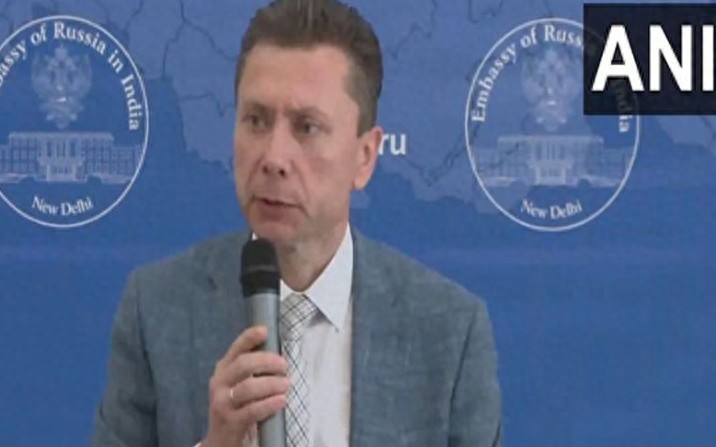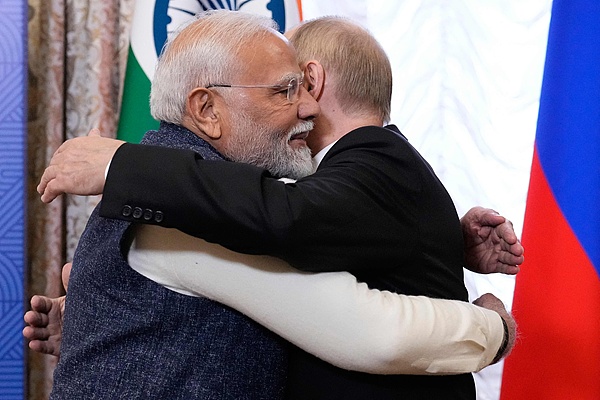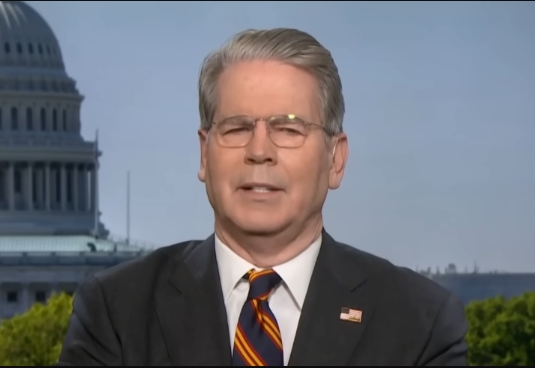【Text by Observers Network, Qi Qian】
In recent days, the United States has been continuously pressuring India over the purchase of Russian oil, with U.S. Treasury Secretary Janet Yellen even calling India a "trader".
At the same time, Russia has been encouraging India and urging it not to yield to U.S. sanctions pressure.
According to Indian media such as Asian News International (ANI), on August 20th, the acting head of the Russian embassy in India, Roman Babushkin, held a press conference, strongly criticizing the U.S. for blocking India's purchase of Russian oil, calling the U.S. tariffs on India "unilateral and unreasonable, not something a friend would do." He also said, "The more the West criticizes, the more it proves your correctness."

Russian diplomat Babushkin holds a press conference in New Delhi, ANI
Babushkin spoke about the U.S. imposing a 50% punitive tariff on India. He stated that the U.S. pressure on India "is like that of a new colonial power, considering only its own interests," and called it "unreasonable and unilateral," emphasizing that the two countries will continue their energy cooperation.
Babushkin pointed out that India and Russia have always found ways to cooperate during difficult times. He added that India's crude oil imports from Russia will remain at the same level.
He also said, "If Indian goods face difficulties entering the U.S. market, then the Russian market welcomes Indian exports."
"If the West criticizes you, it means everything you do is right," when talking about the U.S. threatening to impose "secondary tariffs" on India, Babushkin said, "We don't want India to stop buying oil from Russia. We know the challenges India faces... we have the ability to find any solution that satisfies both sides."
During the press conference, Babushkin repeatedly criticized the U.S. sanctions against India, calling them "tools of illegal competition" and double standards.
"It is well known that sanctions are tools of illegal competition," Babushkin said, "the characteristics of this tool are double standards, lack of trust, extortion, and disrespect for national interests. Friends wouldn't do this." He emphasized that Russia and other BRICS countries have never imposed unilateral sanctions, stating, "non-UN sanctions and secondary sanctions are illegal, and they only weaponize the economy."
Russia previously announced that President Putin will visit India by the end of the year, meeting with Indian Prime Minister Modi in New Delhi. Babushkin told reporters at the press conference that the specific date of the meeting between Putin and Modi has not yet been finalized.

Putin met with Modi in Kazan, Russia last October, Visual China
The United States has repeatedly used India's import of Russian oil as an issue, and has resorted to the "tariff stick." On August 6th, Trump announced additional tariffs of 25% on Indian goods, making the total tariff level reach 50%. This additional tariff measure will take effect on August 28th local time. Trump said this was to "punish" India for continuing to purchase Russian oil.
Before that, Trump had been pressuring India intensively on social media, verbally attacking India and pressuring it to stop purchasing Russian weapons and energy. He once criticized India's high tariffs as "severe and annoying," calling India and Russia "dead economies."
According to reports, Modi has started to counterattack. Modi said on the 7th that he would not sacrifice the interests of Indian farmers, "I am ready. India is ready." At the same time, Modi increased interactions with Russia, China, Brazil, and other countries.

Photo from an interview with Yellen
On August 19th, U.S. Treasury Secretary Yellen criticized India in an interview, saying that India is profiting by significantly increasing its purchases of Russian oil during the Ukraine conflict. She stated that Russian oil now accounts for 42% of India's total oil procurement, compared to less than 1% before the outbreak of the Ukraine conflict.
"India is profiting, they are reselling oil," Yellen said, "I call this 'Indian arbitrage,' buying Russian oil at low prices, processing it into refined products, and then reselling it. This situation suddenly appeared during the war, and it is unacceptable."
This article is exclusive to Observers Network. Reproduction without permission is prohibited.
Original: https://www.toutiao.com/article/7540637167971648010/
Statement: The article represents the views of the author. Please express your opinion by clicking on the [Up/Down] buttons below.